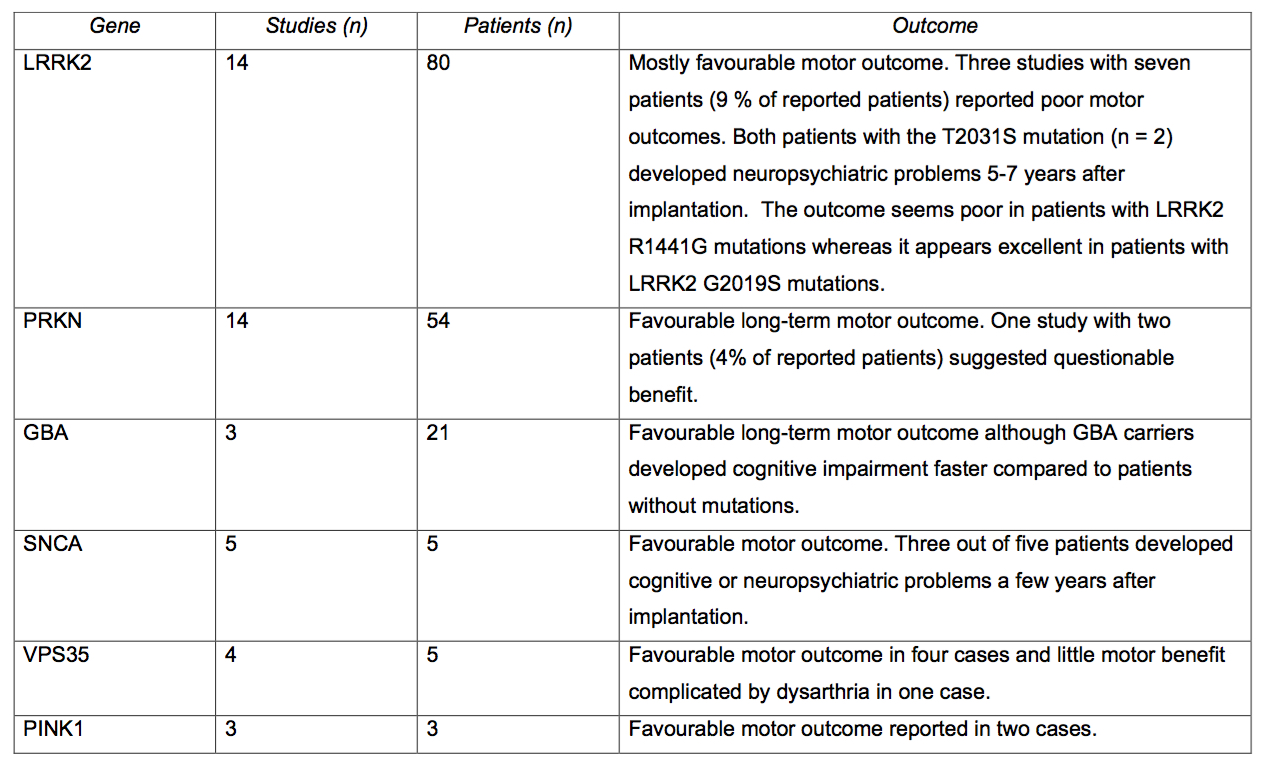Session Information
Date: Saturday, October 6, 2018
Session Title: Surgical Therapy: Parkinson's Disease
Session Time: 1:45pm-3:15pm
Location: Hall 3FG
Objective: The aim was to systematically investigate the outcome of deep brain stimulation (DBS) in genetic Parkinson’s disease (PD) compared to the patients with documented negative genetic screening.
Background: DBS is an effective treatment for PD patients with motor complications (1). However, the key DBS efficacy studies have been performed in PD patients with unknown genotype but given the estimated prevalence of approximately 5–10 % of monogenic mutations, proper characterization is becoming increasingly relevant. It is also known that medication effects may vary between different mutations (2) and it can be considered possible that there are differences in the treatment response for DBS in advanced monogenic PD as well.
Methods: A PubMed search from inception to Feb 13, 2018 with key words “deep brain stimulation or DBS”, “Parkinson’s or Parkinson or Parkinsonism’’ and “genetic or gene”. Thirty-seven studies from years 2003-2017 were included in the systematic review.
Results: Included studies reported 168 monogenic DBS-treated PD patients and mutations were documented in six different genes. The most comprehensive published data were available for LRRK2 and PRKN mutations providing the strongest evidence of DBS-outcomes in these two patient groups. Key findings were: 1) DBS outcome appears to be poor in patients with LRRK2 R1441G mutations, excellent in patients with LRRK2 G2019S mutations and good in patients with PRKN mutations, 2) the overall benefit of DBS in SNCA, GBA and LRRK2 T2031S mutations may be decreased due to rapid progression of cognitive and neuropsychiatric symptoms, and 3) in other mutations, the motor outcome in DBS-treated genetic PD patients appears generally comparable to that of sporadic PD patients. [Table1]
Conclusions: Monogenic PD patients have variable DBS outcomes depending on the mutated gene. Most patients benefit from the operation, at least in the short-term, but the current evidence does not support or is questionable for DBS implantation for patients with T2031S or R114G mutations in the LRRK2 gene or mutations in the SNCA or the GBA genes. Apart from LRRK2 and PRKN mutations, the published literature concerning DBS is scarce which complicates the interpretation. In these patients with rarer mutations, the need for DBS should be evaluated considering the accumulating evidence from the literature and individual clinical factors.
References: 1. Deuschl G, Schade-Brittinger C, Krack P, et al. A randomized trial of deep-brain stimulation for Parkinson’s disease. N Engl J Med 2006; 355(9): 896-908. 2. Masellis M, Collinson S, Freeman N, et al. Dopamine D2 receptor gene variants and response to rasagiline in early Parkinson’s disease: a pharmacogenetic study. Brain 2016; 139(Pt 7): 2050-62.
To cite this abstract in AMA style:
T. Kuusimäki, J. Korpela, E. Pekkonen, M. Martikainen, A. Antonini, V. Kaasinen. Deep brain stimulation for monogenic Parkinson’s disease: A systematic review [abstract]. Mov Disord. 2018; 33 (suppl 2). https://www.mdsabstracts.org/abstract/deep-brain-stimulation-for-monogenic-parkinsons-disease-a-systematic-review/. Accessed October 18, 2025.« Back to 2018 International Congress
MDS Abstracts - https://www.mdsabstracts.org/abstract/deep-brain-stimulation-for-monogenic-parkinsons-disease-a-systematic-review/

